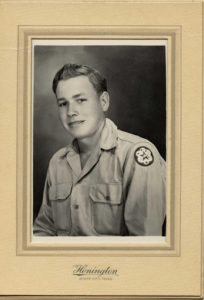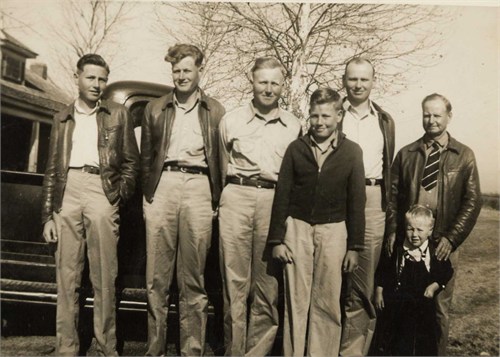In the Winter of 1945, the Germans launched one final assault in the West known as the Battle of the Bulge. Where capable, other fronts saw limited German offensives including in Southern France. These were largely ineffective outside of the main thrust. However, it did reveal that Germany had some fight left.
However, by the end of January 1945, only the truly zealous Nazis remained in the fight. They were retreating back towards Berlin, planning to make one last glorious stand against the Red Army. The Allies had all agreed to allow the Soviet Union to destroy whatever remained of Berlin. While the Red Army closed the noose around the German capital, the Allies secured the remaining occupied nations in the West, and mopped up what remained of the German Army in the South – most willingly surrendering to US troops, rather than being captured by the very angry Red Army.
For most US soldiers, the last months of the war was a time to stay vigilant, as you never knew for sure who was a friend, or foe. Both sides knew the end was near, and began thinking about what would come next. Thankfully, most Germans were tired of war. – Harrison Woodard
The Woodard Boys Go to World War II
Victory In Europe – Part 7
By Hollis Hood Woodard
(1917 – 2009)
Virgil and I didn’t get much sleep that night because he was bringing me up to date on what had happened since I left home to come overseas. When he left the next morning I almost cried. He was my little brother just eighteen years old and having to go back on the line. Again I started praying really hard for his safety as well as mine.
I tried to keep up with Virgil and knew almost every time they were fixing to get into some heavy fighting. We were doing pretty good until the Germans started those bulges. We had a small one down on our front but were able to contain it although we did have to pull back and stabilize the line at one time. Virgil and I tried to keep each other posted as to what was going on and how we were doing. But when the big bulge broke loose on the other front we expected that we might have to go up there and help out. When they called General Patton’s army to come up to help out, my outfit and Virgil’s outfit was pulled out of General Patton’s 7th Army and attached to General Patton’s 3rd Army and headed up to the other front. Since General Patton was a tank general he sent his tanks on ahead and my outfit and Virgil’s didn’t get into any action on that front. It was extremely cold and was snowing on us all the time. My little dog named Brownie was a short haired Terrier and I put him inside my jacket to keep him warm. He would stick his head out but would whine and jerk it back in. I thought I would freeze on the trip and was glad when they sent us back to the 7th Army.
After the Bulges the German Army started falling apart and we had more prisoners than we could handle. One of my men and I took ten prisoners one morning. We were going into this town and they came out of the timber with a little white flag. We took them with us on into the small village and had them standing in formation in front of a German café. One old German man that spoke perfect English really got me upset. He kept going over to those German soldiers telling them something and I was afraid that since there were only two of us with the ten outside that he might have been plotting something. I asked him not to talk to the soldiers. He told me that they had been out in the woods in the snow all night and were cold and I should take them in the Café where it was warm. I told him that we were out in the snow and we were cold and they could stay out there with us. Well he snorted and stated, “You are hard-hearted”. After he said that I put my pistol barrel in his rib cage and marched him to the formation of German prisoners and put him in line and told him if he opened his mouth again or got out of the formation I was going to beat him over the head with my pistol. Later, my officer came up and wanted to know why I had the old gray headed man in the bunch of prisoners and I told him he was trying to cause trouble and I had to do something with him. I told him he spoke English to go over and talk with him. He went and told him that we were letting him go and wanted him to head home right away. Well that old fellow left there like he was shot out of a cannon. We then had to decide what to do with the ten prisoners we had because we didn’t have transportation for them and the nearest prisoner of war camp was about seven miles away. Finally, we found out who was the ranking one in the group and called him out and told them we wanted them to report to this camp. We made each one a white flag and put them on the road. My officer told me that they would never get to that camp, but later that evening we came back up the road and turning into the prisoner camp was our ten German soldiers with the little German Corporal leading them on with his flag held high.
The Germans started surrendering in large groups and I will never forget seeing one German Division coming down out of the hills walking four abreast with their white flag waving. We were a little worried that we couldn’t see any allied soldiers with them but when they got closer we noticed that an American soldier was leading them on a bicycle with a small pistol in his pocket. He told us as they passed that he was a prisoner and that they released him to lead them down out of the mountains. After they passed a British soldier on a bicycle with a small pistol was following them. He also told us he was a prisoner and had been released to help them surrender.
After the war was over, I looked Virgil up to be sure he was alright. I decided to take it easy and try to settle my nerves, but the Army believes in keeping you busy. They decided to throw an inspection. On the morning of the inspection as I was cleaning my pistol I could tell that I wasn’t feeling well and wondered if I was going to be able to make it, but decided to try. There were four of us platoon sergeants lined up in front of our platoons, and the Captain was going to inspect us first. I was the third one inspected and I could tell something was wrong. When the Officer grabbed my pistol, the lights went out. When I came to, they had me out under the shade of a tree trying to find out what had happened. One of my men told me that when the Inspection Officer grabbed my pistol, I went down like I was shot. I tried to answer the Medical Officer’s questions the best I could. I didn’t know what went wrong, but deep down I felt that I had carried quite an emotional load watching out for my own welfare, and checking on my brothers. They carried me to the Medical Tent and checked on me the remainder of the day before finally releasing me. I have to admit I was just a little bothered and was hoping it didn’t indicate I might be having some trouble with my heart.
We began making preparations for going home but were to learn that we would have to wait until they sent men in the European Theater that qualified to the Pacific theater. Most of the people in my outfit had fought in two theater of operations and were not to be sent to another. Which would mean we wouldn’t start home until they had sent those qualified to the Pacific Theater. It turned out that the Pacific war ended shortly and we were all to go back to the states. I left Germany in September 1945 and Virgil followed about three months later.
Joe went into the army after I was discharged. He was sent to the Philippines for occupation duty. This turned out to be pretty bad since the Philippine Communists didn’t want them there and attacked them one day. Joe said it was touch and go for awhile but they sent them back into the hills licking their wounds.
Frank came home from Italy sick in 1944 and was given a disability discharge. H.L. came home from Italy later in 1944 and was assigned guard duty in Oklahoma, guarding German prisoners of war that were being used to help the Oklahoma farmers.
One thing I forgot to mention was that in the early part of the Italian campaign two of my best friends were killed in combat. I was the last one to talk with them before they were killed. We were up in the back of a truck late at night talking. I knew we should be trying to get some sleep and would tell them I was going to my foxhole, and they would tell me let’s talk some more. I began to feel that something was about to happen to them or to me. One mentioned several times that he should have married his girl friend before he came overseas. The other mentioned things that he wished he would have done as if they would never get the chance to do these things again. Finally, I talked them into going to bed. I had tried to go to sleep, but couldn’t, because I was troubled about the conversation we just had. My foxhole was about eight to twelve feet from theirs and I heard a German gun fire and then a tremendous explosion. I knew it had hit close because it blew my tent down on top of me in my foxhole and for a few minutes I thought I might be hurt, but some of the guys came up and pulled it off me and helped me get out of my hole. After I got out, they told me Paulus and Seria had received a direct hit on their hole and they were both dead. Then I knew that these two might have had some indication from somewhere that their time to go was near. We didn’t sleep anymore that night. When they came to get the bodies, all the guys were crying and wondering why this would happen to these two soldiers. I went back to my foxhole and set on the edge with my feet down in the hole. I couldn’t cry, but I felt that my chest was going to explode because I was so hurt over the loss of these two friends of mine. The thing that really got me was one of the guys noticed me and told his friend, “Look at that hard-hearted Sergeant, he is not shedding a tear”. I was a sergeant in our group and was as torn up as the rest, but wasn’t showing it. Two times overseas I was told I was hard-hearted, but I doubt if there was anyone in our outfit that had a bigger heart than I had.

Woodard Family circa 1942: 1st Row (L to R) – Billy Woodard (Twin), Virgil Woodard (Father), Lona Tinney Woodard (Mother), Betty Woodard Simms (Twin), Wanda Woodard Pinson; 2nd Row – Joe Woodard, Newman Ray Browning (Grandchild held by Son-in-Law) Homer Browning, Janie B. Woodard Browning, Bonnie Woodard Hampton, Susie Woodard Ogden, Grace Woodard Horne, Ruth Woodard Dacus; 3rd Row – Virgil Woodard, H. L. Woodard, Frank Woodard, Hollis Woodard
I know there are some things that I have missed, but it has been fifty years since I wore a uniform, and if I added everything, this would be as long as a book. One thing I must mention that helped the Woodard boys was that our Mother and Dad carried us to church and Sunday School where we had learned to trust and lean on our Lord for everything.
Note: The Woodard Brothers participated in the following theaters:
Hollis – Naples-Foggia, Rome-Arno, Southern France, Rhineland,
Ardennes-Alsace, and Central Europe Theaters.
H. L. and Frank – Naples-Foggia and Rome-Arno Theaters.
Virgil – Rhineland, Ardennes-Alsace, and Central Europe Theaters.
Joe came in after the war in Europe ended, and was sent to the Pacific Theater, specifically Philippines.
Billy – Like his brothers, he was a fighter, but just too young for this war.
Part 1 – Part 2 – Part 3 – Part 4 – Part 5 – Part 6 – Part 7 – Part 8
Search for Other Christian Web Sites.





